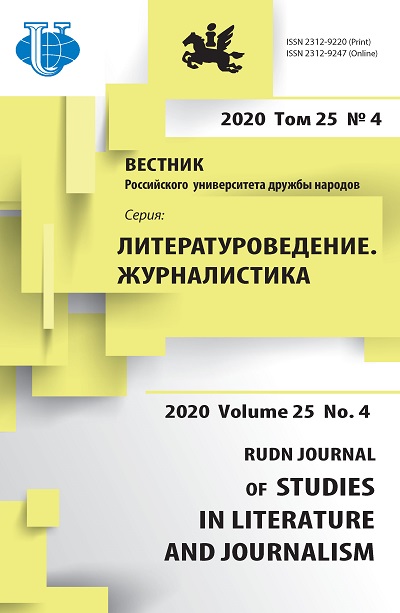Культурные коннотации образа восприятия эмигрантов в китайском этническом сознании 20-40-х годов ХХ века на материале китайской литературы и публицистики
- Авторы: Лю Ш.1
-
Учреждения:
- Амурский государственный университет
- Выпуск: Том 25, № 4 (2020)
- Страницы: 671-681
- Раздел: Литературоведение
- URL: https://journals.rudn.ru/literary-criticism/article/view/25452
- DOI: https://doi.org/10.22363/2312-9220-2020-25-4-671-681
- ID: 25452
Цитировать
Полный текст
Аннотация
Актуальность исследования определяется интересом современного гуманитарного знания к изучению образа «чужого», исследованию механизмов рецепции инокультурного и иноэтнического мира в процессе межэтнического и межкультурного взаимодействия ХХ века. Новизна обусловлена привлечением материала публицистических и художественных текстов китайских авторов «левого» и «правого» крыла в их соотнесенности с историко-политическими и лингвокультурными реалиями 20-40-х годов XX века. Проблема исследования состоит в корреляции этнокультурных, этнопсихологических и социально-политических коннотаций образа восприятия эмигранта в китайском этническом сознании. Целью исследования является изучение лексико-семантических трансформаций понятия «эмигрант» в контексте китайской идеологии и китайской литературы 20-40-х годов ХХ века, а также выявление индивидуальных черт художественного восприятия эмигранта китайскими писателями. Методология исследования опирается на имагологический подход к исследованию литературы с привлечением этнопсихологических наблюдений. В работе использованы историко-литературный, сравнительно-исторический, лексико-семантический методы, а также приемы переводоведения. В результате исследования обнаруживается, что в китайских художественных и публицистических текстах указанного периода преобладает негативный художественный образ восприятия эмигрантов - «белоэмигрантов». Таким образом, негативная семантика культурных коннотаций понятия «эмигрант» в китайском этническом сознании 20-40-х годов прошлого века, с одной стороны, отразила реальные обстоятельства эмигрантской жизни и эмигрантского сознания; с другой стороны - запечатлела сложные общественно-политические и этнопсихологические процессы, протекающие в китайском обществе, затрагивающие глубинные основания китайской культуры и китайской этничности.
Об авторах
Ши Лю
Амурский государственный университет
Автор, ответственный за переписку.
Email: 228349909@qq.com
магистр филологии, аспирант кафедры литературы и мировой художественной культуры
Российская Федерация, 675027, Благовещенск, Игнатьевское шоссе, д. 21Список литературы
- Забияко А.П. Фреймы в религиоведении // Вестник Российского сообщества преподавателей религиоведения. 2008. № 1. С. 33-35.
- Забияко А.А. Ментальность дальневосточного фронтира: культура и литература русского Харбина. Новосибирск: Изд-во СО РАН, 2016. 447 с.
- Lv Shuxiang, Ding Shengshu. Xiàndài hànyǔ cídiǎn [吕淑湘, 丁声树. 现代汉语词典]. Beijing, Shangwu yinshuguan, 2016.
- Xīn shídài éhàn xiángjiě dà cídiǎn [新时代俄汉详解大词典]: in 4 vols. Vol. 4. S-Ya. Beijing, Shangwu yinshuguan, 2014.
- Телия В.Н., Опарина Е.О. Культурная коннотация как способ воплощения культуры в языковой знак // Культурология. 2011. № 1. С. 145-148. URL: https://rucont.ru/ efd/472129 (дата обращения: 16.09.2019).
- Li Dingsheng. Xiàndàiyǔ cídiǎn [李鼎声. 现代语辞典]. Shanghai, Guangming shudian, 1933.
- Yang Hui. Zhōngé wénběn shìyù xià de qúqiūbái wénxué sīxiǎng [杨慧. 中俄文本视域下的瞿秋白文学思想] // Jílín dàxué xuébào [吉林大学学报]. 2015. No. 2. Pp. 133-139.
- Балакшин П.П. Финал в Китае: возникновение, развитие и исчезновение белой эмиграции на Дальнем Востоке: в 2 т. Т. 1. М.: Изд-во ГПИБ, 2013. 528 с.
- Jin Gang. Éluósī wénhuà duì jìnxiàndài dōngběi wénxué de yǐngxiǎng [金钢. 俄罗斯文化对近现代东北文学的影响]. Beijing, Publishing House of Social Studies Source, 2018.
- Pageaux D.-H. Une perspective d’études en littérature comparée: l’imagerie culturelle. Synthesis. Bucharest, 1981. 228 р.
- Chao Juren. Lǔxùn niánpǔ [曹聚仁. 鲁迅年谱]. Beijing: People's Literature, 1981.
- Zhang Hong. 1927-1937 nián shànghǎi jǐngchá [章红. 1927-1937年上海警察]. Shanghai: Shanghai ancient book, 2004.
- Kuang Xinnian. 1928 nián de gémìng wénxué [旷兴年. 1928年的革命文学]. Jinan: Shandong Education, 1998.
- Fǎn dìguó zhǔyì duì sūlián de wǔzhuāng gōngjī [反帝国主义对苏联的武装攻击] // Hóngsè zhōnghuá [红色中华]. 1931. No. 3.
- Li Yimang. Suí bǐ - báirén yímín yǔ zhōngguó wúchǎnjiējí [李一氓. 随笔 - 白人移民与中国无产阶级] // Bā ěr dǐ shān [巴尔底山]. 1930. No. 2.
- Yang Hui. Kǔnán de fēngjǐng: 1930 niándài zhōngguó wénxué zhōng de báié qǐgài [杨慧. 苦难的风景: 1930年代中国文学中的白俄乞丐] // Nán kāi dà xué xué bào [南开大学学报]. 2013. No. 4. Pp. 119-129.
- Lu Xun. Tī [鲁迅. 踢] // Shēnbào: zìyóu tán [申报: 自由谈]. 1933. No. 2.
- Feng Naichao. Piànduàn: cóng báié lǎopózǐ shuōqǐ [冯乃超. 片断: 从白俄老婆子说起] // Xiàndài xiǎoshuō [现代小说]. 1929. No. 1. P. 3.
- Shu Qun. Wú guójí de rénmen [舒群. 无国籍的人们] // Zhàn dì [战地]. Shanghai: Bei Xin, 1938.
- Ma Jia. Fùchóu zhī lù [马加. 复仇之路] // Shìjiè dòngtài [世界动态]. 1936. No. 1. P. 61.
- Wang Yamin. 20 shìjì 20-30 niándài zhōngguó xiàndài wénxué yǔ éqiáo wénxué zhōng de shànghǎi [王亚民. 20世纪20-30年代中国现代文学与俄侨文学中的上海] // Lánzhōu xuékān [兰州学刊]. 2015. No. 8. Pp. 6-11.
- Qian Xingcun. Yīgè luósuǒ nǚrén [钱杏邨. 一个罗索女人] // Xīnliú yuèbào [新流月报]. 1929. No. 2.
- Qian Xingcun. Yīgè luósuǒ nǚrén [钱杏邨. 一个罗索女人] // Qián xìng cūn wén jí [钱杏邨文集]. Shanghai: Modern Book, 1929. Pp. 373-393.
- Zhang Mingyang. Báié zài yuǎndōng [张明养. 白俄在远东] // Tài bái [太白]. 1935. No. 4.
- Zhou Lengjia. Qiáo mín [周楞伽. 侨民] // Shēnbào: zìyóu tán [申报:自由谈]. 1933. No. 2. P. 6.
- Cheng Bibing. Hòu xù [程碧冰. 后序] // Zài bìngyuàn zhōng [在病院中]. Shanghai: Shenzhou Guoguang, 1931. P. 5.
- Wei. Báié zài hāěrbīn [微. 白俄在哈尔滨] // Hàn xuè zhōukān [汗血周刊]. Harbin, 1935. Pp. 14-20.
- Jin Yi. Yǔn [靳以. 陨] // Dōngfāng [东方]. Shanghai, Commercial Press, 1931. Pp. 11-27.
- Zhang Yan. Kǒng zǐ xíngxiàng xiángxī [张岩. 孔子形象详析] // Liáoníng dàxué xuébào [辽宁大学学报]. 2003. Pp. 35-36.
- Zhou Yunpeng. Mínzú zhǔyì wénxué lùn 1930-1937 [周云鹏. 民族主义文学论1930-1937]: PhD Thesis, Philological Sciences. Shanghai, 2005.
- Qin Jiaqi. Guānyú “yòuyì” wénxué yánjiū ruògàn wèntí de sīkǎo [秦家琪. 关于“右翼”文学研究若干问题的思考] // Nánjīng shīfàn dàxué xuébào [南京师范大学学报]. 1986. No. 3. Pp. 32-40.
- Huang Zhenxia. Shìjiè de zhǔrén [黄震遐. 世界的主人] // Shēnbào: yìshù jiè [申报: 艺术界]. 1928. No. 2.
- Huang Zhenxia. Lǒnghǎi xiànshàng [黄震遐. 陇海线上]. Shanghai, Shanghai Bookstore, 1989.
- Li Xinggeng. Éqiáo zài zhōngguó [李兴耕. 俄侨在中国]. Beijing, Bureau of the Central Committee of the Translation and Editing, 1997.
Дополнительные файлы















